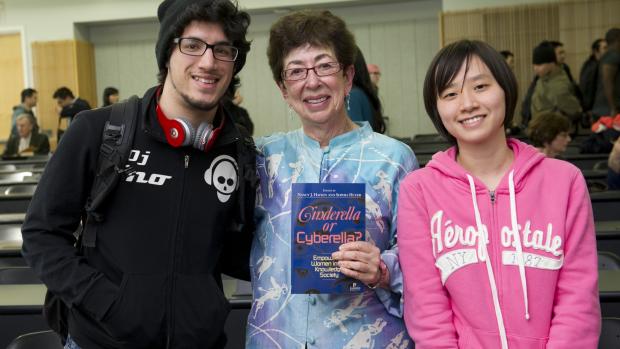Women in Technology—Not Just a Fairy Tale
Nancy Hafkin, author of Cinderella or Cyberella?: Empowering Women in the Knowledge Society, takes part in a Department of Technology, Culture and Society (TCS) lecture series

It was standing room only when Internet Hall of Famer Nancy Hafkin took the stage to speak on April 9, as part of the Polytechnic Institute of New York University (NYU-Poly)’s “Technology and Society” lecture series. Called “Cinderella or Cyberella: Getting Girls & Women Fully into Information Technology,” the talk explored how women around the world are engaging with information technology.
Hafkin has big questions. Are women and girls participating fully—at all levels--in what she calls the Information Society, a society in which knowledge is our primary resource and success equals knowing how to effectively create, use and disseminate that knowledge? How is the Internet changing lives of girls and women worldwide? And, perhaps most importantly, what can we all do to ensure that girls and women benefit from and contribute to all aspects of the knowledge society?
Hafkin, whose work in Africa helped build the continent’s Information and Communications Technologies (ICT) framework through partnerships with governmental, nongovernmental, and development institutions, also has some answers.
Although women are undeniably lagging behind in the tech sector, she is vehement about the fact that society as a whole will benefit when they begin participating more fully. “We can’t exclude 50 percent of the population,” she said. “We need to use 100 percent of our human resources.” The U.S., for example, needs an estimated 80,000 new engineers and computer scientists each year but produces only about half that, so it’s imperative that more women—who are now making up the majority of college students—become involved in those fields. We don’t need “Cinderellas,” women who will occasionally make use of technology but are happy to work—if at all—in the lower echelons of STEM fields, Hafkin asserts. We need “Cyberellas” who are fluent in technological terms, comfortable in virtual spaces and willing to innovate and actively create.
There is a gender divide in every country she has studied, Hafkin explained, and it gets worse as the career ladder heightens, thanks to a “leaky pipeline,” that sees women drop out of the workforce altogether or settle for entry level jobs.
The factors in the phenomenon range from girls’ lower confidence levels (even when they are performing just as well as boys), a lack of positive female role models in tech industries, and, in many countries, lack of access to computers and education.
Hafkin hasn’t only studied the problems, she’s looked for solutions, and she knows that female-friendly public policies make a huge difference. Girls and women need not only access to technology but assurances that their physical safety is ensured and their rights protected.
According to her Internet Hall of Fame citation, Hafkin “has been instrumental in helping raise global awareness of issues related to gender and information technology and development,” and she certainly raised awareness in Jacobs Hall on April 9. Her lecture at Poly was made possible with support from Poly alum, Peter Barker-Homek, who is also sponsoring a Poly class on Women and Human Rights in Developing Countries.




